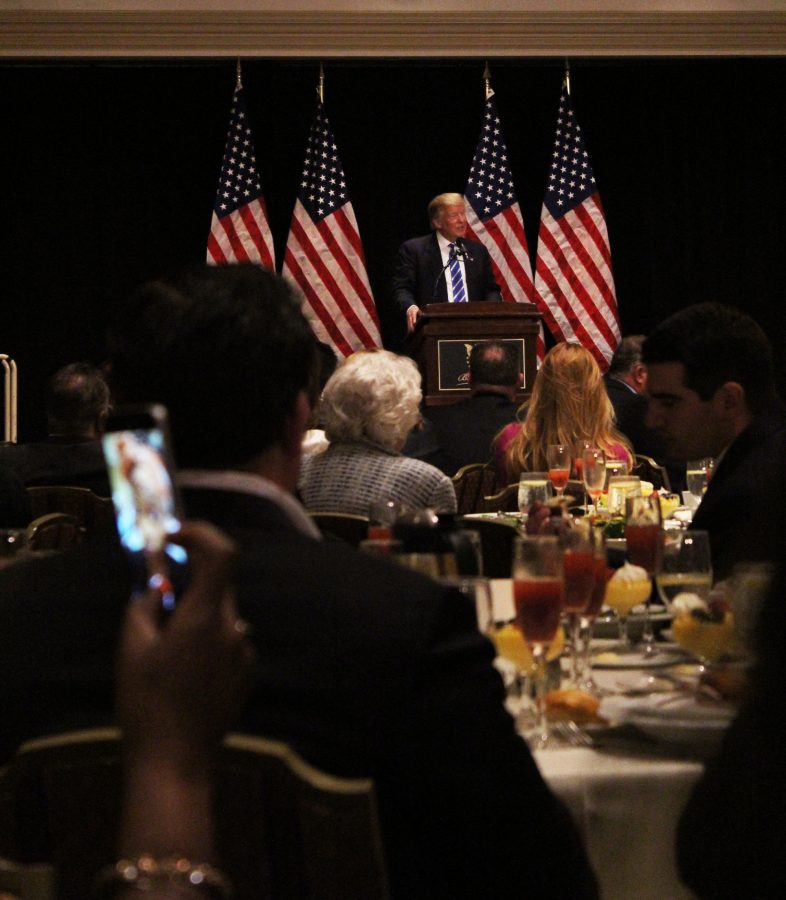Donald Trump fundraiser at Bolingbrook Golf Club
September 29, 2016
The national anthem rang out deep and raw, cutting through the silence that had settled over more than 300 people gathered in the Bolingbrook Golf Club Wednesday for a Donald Trump Fundraiser.
To my left, a woman began humming along, her voice melding with the Anthem’s as its last notes faded into the air. Her name, is Judy Yu. Originally from Taiwan, Yu is a retired cardiologist, mother of six, and avid supporter of the Republican presidential nominee.
“Our country needs new leadership, someone strong,” Yu said. “Just like Trump says himself, he will never be bought by lobbyists or special interests. He wants ‘real change’… this is why I love him.”
The Reagan Ballroom is filled with supporters who, like Yu, appreciate Trump for his “honest” approach.
“He’s direct and blunt, and that’s not for everyone,” said Kelley Speck, a Bolingbrook businesswoman. Indeed, many of Trump’s supporters at the fundraiser felt alienated in the campaign’s early days, describing how they were called “racists” when exposing their support for Trump to friends and colleagues. For this reason, Speck is wary that today’s polls might not be showing the whole picture.
“I don’t really think there’s a large gap between Hillary and Trump,” Speck said. “There are probably still many closet supporters out there.”
Even so, in a race for the White House between two of the most disliked candidates in history, what are Trump’s chances? Co-chairwoman Demetra Demonte of the Illinois GOP remains positive.
“Mr. Trump is gaining incredible momentum going forward,” Demonte said. “As co-chair, I believe Illinois is still in play. Our numbers are looking good, and I hope to shock the nation with an Illinois win.”
Illinois hasn’t backed a Republican presidential candidate in over 27 years. Current polls show Clinton leading Illinois by 14.5 points, which is a 10.5 points decline from her 25-point gap that was polled in May. Although Trump’s political director has shifted the campaign’s focus towards other key states, the candidate himself still hopes to win Illinois.
“I got a call from a friend of mine the other day, and he [told me], ‘you can win this state!’’” Trump said, spreading his arms wide. “And we are. We are going to win Illinois.”
So, what could make the difference for Trump? For some, the candidate’s “temperament,” as remarked upon in Monday’s debate, leaves something to be desired.
“There are people who don’t question [Trump’s] policies, but who do question his tact,” said Jack McInerney, CD-11 IL Trump Delegate. “Trump grew up in New York real estate – not a very kind environment. He’s a rookie politician who likes to win, and one year, someone like him could win.”
Regardless of the outcome, countless polls and headlines scream that America is ready for change. An NBC News/Wall Street Journal poll indicates that 59 percent of all voters prefer a candidate who will bring the greatest changes to current policies, even a candidate with less political experience, an increase from 55 percent who felt the same in July 2008 during the general-election contest between Barack Obama and John McCain.
McInerney is among those looking for change.
“The Obama administration covers up reality with glowing reports on an ash-heap of an economy, ” McInerney said. “Even Hillary is a classic depression-era lefty. The real unemployment rate sits at 18 to 20 percent today; the government tells us it’s only around five percent.”
After a prolonged recovery from the 2008 recession, today’s economy is burdened with multiple international concerns: among them, OPEC countries flooding the market with oil and currency instabilities. Although some dub today’s economic state as a “Goldilocks economy” with neither too much nor too little inflation and deflation, along with healthy GDP growth at two to three percent, international factors are linked to domestic concerns. Trump points to jobs — and their economic impact — as a particular threat.
“We have five trillion jobs outside of the U.S.,” Trump said. “It’s almost impossible to get this money back in, and that’s just a lack of leadership. Hillary’s going to raise taxes by 1.3 million, we’re going to cut taxes massively for the middle class.”
Trump later cracked a joke by commenting how H&R Block, a tax preparation company, “would not be very happy with us” in regards to a Trump administration’s proposed tax policy, should he be elected.
Among others speaking at the fundraiser were Judy Joliette, former mayor of New York, and Roger Claar, mayor of Bolingbrook.
“I’m tired of political correctness,” Claar said. “This guy [Trump] says what he thinks, and I do too.”
Although Claar has been open about his support for Trump, attendees at the banquet remarked that he has taken “a lot of heat” from community members and businesses for organizing and hosting Wednesday’s fundraiser. Tensions across the board are high; across the street from the event venue, a wall of protesters stretched across Rodeo Road, held back by road blocks, secret service, and Bolingbrook Police. The protests at the Bolingbrook fundraiser seem tame, however, in contrast to the cancelled Trump rally at the University of Chicago on March 11.
“We were in the middle of what they call the ‘mosh pit,’” said John Mahalik, a donor at the Trump Fundraiser. “It was mostly protesters who were stirring up trouble … ripping up signs and throwing punches. Bernie’s people had a 20-foot metal pole swinging a Bernie flag. How’d they get that inside? How’d they get that past the metal detectors?”
Mahalik and his wife feared for their security at the event and were shocked that no Chicago police were positioned inside the auditorium.
“It was so terrifying inside,” Mahalik said. “Ushers that were supposed to be private security just turned their back and laughed when we asked for help.”
Many agree that this election is unlike any in United States History. In a world so unsure of its next political step, many factors could determine the outlook of our country’s next term.
“When I was growing up, I visited a 1930s grave belonging to Joseph Stalin…have you heard of him?” McInerny paused. “What he did was he created a five year plan. Russian people would starve to the point of cannibalism, and then were told to get up in front of the press and say ‘we are dizzy with success…we’re dizzy with success.’ That’s not a future I want to see for America.”
Change is on the horizon: the question is, what future will Americans choose come Nov. 8?








